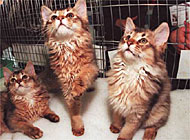Mad Cat epidemic unlikely in Switzerland

Veterinarians have dismissed fears about a possible epidemic of feline spongiform encephalopathy (FSE) in Switzerland. Concerns were raised after a cat in canton Vaud contracted the disease, which is related to mad cow disease or BSE.
The six-year old animal was put to sleep after being diagnosed. The source of the infection is still unknown, but the Swiss authorities have said they believe the cat was infected by food containing insufficiently cooked brain parts.
“We suspect the animal contracted FSE through its food”, Heinz Mueller, a spokesman for the Federal Health Office told swissinfo.
Switzerland outlawed the use of brain and spinal cord in food preparations in 1996. Under Swiss law, the bodies of domestic and wild animals diagnosed with spongiform encephalopathis must also be incinerated.
Rosmarie Fatzer, a veterinarian for the Animal Neurology Institute at Bern University, told swissinfo the measures taken since 1996 were sufficient to protect cats from getting the degenerative disease. Like Heinz Müller, she said she does not expect an epidemic in Switzerland, but conceded “there is always some uncertainty with these kinds of diseases.”
The Society for Domestic Animal Food (SDAF), which is made up of major pet food producers, has said it is not worried by the discovery of “mad cat disease” in Switzerland.
“I’m absolutely certain our products do not represent a threat for domestic pets”, said the society’s spokesman, Bernhard Welten.
Since 1990, producers belonging to the SDAF have voluntarily refrained from using ingredients which pose a potential health threat.
For the past three years, imports of fodder from abroad have been submitted for approval to the federal veterinary office.
FSE first appeared in Britain in 1990. Since then 90 domestic cats have been diagnosed with the disease in the United Kingdom, and two other cases have been registered in Norway and Liechtenstein.
Cases of FSE have also been recorded among wild felines, such as lions and tigers. These animals had been fed with raw cast-offs from local meat processing factories.
FSE belongs to the category of transmissible spongiform diseases, but poses no threat to humans. It can only be passed on through the food chain.
The infectious agent responsible for FSE is thought to be closely related to the BSE prion. The incubation period is five years, the same as for mad cow disease.
The Swiss authorities also announced on Tuesday a slight decrease in the number of cases of BSE during the first six months of the year, despite more and more voluntary tests. Nineteen cases have so far been registered in Switzerland in 2001, versus 22 last year.
Over 70,000 animals were tested for BSE from January to early July, three times as many than the previous year.
Switzerland currently hosts 1,3 million cats.
swissinfo with agencies

In compliance with the JTI standards
More: SWI swissinfo.ch certified by the Journalism Trust Initiative
You can find an overview of ongoing debates with our journalists here. Please join us!
If you want to start a conversation about a topic raised in this article or want to report factual errors, email us at english@swissinfo.ch.